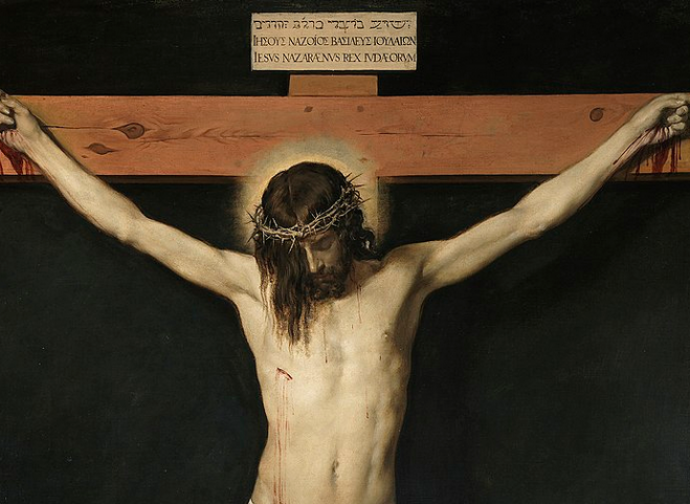Jesus, the suffering King who conquers the world
Good Friday: Jesus is crowned with thorns between being scourged and the crucifixion. Thus, his kingship is affirmed even by those who mock and ignore him. He is also forced to wear a purple robe, which symbolically contains another call to imitate Him, even to the point of shedding blood for love. (Edited by Father Konrad zu Löwenstein)

We publish below the second part (see the first here) of the exegesis of the Jesuit Father Cornelio a Lapide (1567-1637) on the crowning of Jesus with thorns.
Symbolically: S. Bernard says, “Though they crown Him in derision, yet in their ignorant mockery they confess Him to be a crowned King. Therefore is He proved to be a King by those who knew Him not.” And S. Augustine says, “Thus did the Kingdom which was not of this world overcome the proud world, not with fierce fighting, but lowly suffering. [Jesus comes forth] wearing the crown of thorns and the purple robe, not resplendent in power, but overwhelmed with reproach.” “Purple,” again says Elias Cratensis, “exhorts good rulers to be ready to shed their blood for the benefit of their subjects.” Hence the purple is given to Cardinals to remind them that they should shed their blood for the Church; and S. Germanus, Patriarch of C. P., says that the purple robe and the crown of thorns which was placed on Him before His crucifixion assured the victory to Him who said, “Be of good cheer, I have overcome the world.”
[Pseudo-]Athanasius (de Cruce) strikingly says, “When the Lord was arrayed in the purple, there was raised invisibly a trophy over the devil. It was a strange and incredible marvel, and doubtless a token of great victory, that they placed the ornaments of triumph on Him whom they had struck in mockery and derision. He went forth to death in this array, to show that the victory was won expressly for our salvation.” He points out also that Christ was crowned with thorns to restore to us the tree of life, and to heal our worldly cares and anxieties by taking them on Himself.
Godfrey of Bouillon refused on this ground to be crowned king of Jerusalem, since it ill became a Christian king to wear a crown of gold in the very city in which Christ had worn one of thorns.
Anagogically: Tertullian says Put on Christ’s crown of thorns, “that so thou mayest rival that crown which afterwards was His, for it was after the gall that He tasted the honey; nor was He saluted as King by the heavenly hosts till He had been written up upon the Cross as the King of the Jews. Being made by the Father a little lower than the angels, He was afterwards crowned with glory and honour.” “Christ,” says S. Jerome, “was crowned with thorns that He might win for us a royal diadem.”
And a reed in His right hand. This, which represented His sceptre as King of the Jews, was a fragile, worthless, mean, and ridiculous thing. It is described as a smooth cane with a woolly top.
And they bowed the knee before Him, and mocked Him, saying, Hail, King of the Jews! Notice here all that was done in jest. Bringing together the whole band as an attendant army. His throne a stone or seat, raised up like a tribunal. His crown was of thorns, His robe a scarlet chlamys, His sceptre a reed; in the place of the people’s applause were the mockings of the soldiers; there were the spittings, the blows, and the stripes. All these did Christ bear with divine humility and patience, and thus deserved “that at the name…” &c.
Tropologically: Christ here wished to set forth the vain estate and the sufferings of all kings and rulers; to turn all insults into weapons of victory, and specially to overcome the pride of Satan by His humility; to teach that worldly kingdoms consisted in pomp and display, His in contempt of honour, pleasures, and self. See Theophylact, Jansenius [Gaudno], Pseudo-Athanasius, and Tertullian, ut supra.
It is to be noted that Agrippa was shortly afterwards insulted at Alexandria exactly in the same way.
And they spit upon Him, and took the reed, and smote Him on the head. As having foolishly aspired to be King of Judæa; to drive also the crown of thorns more firmly into His head. These grossest insults and most cruel pains were devised by devils rather than men, says Origen. “Not one member only, but the whole body suffered these atrocious injuries,” &c., says S. Chrysostom.
